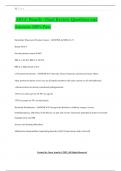1|Page
ABGC Boards - Final Review Questions and
Answers 100% Pass
Hereditary Breast and Ovarian Cancer - ANSWER ✔✔-BRCA 1/2
Breast 50-87%
Second primary tumor 50-64%
BRCA 1: 20-45% BRCA 2: 10-30%
BRCA 2: Male breast 6-10%
Li-Fraumeni Syndrome - ANSWER ✔✔--Sarcoma, breast, leukemia, adrenal and many others
-May present in almost every way (ie all family members with same cancers or all with different)
-Adrenocortical carcinoma considered pathognomonic
-50% have some type by 30, 90% by age 60
-TP53 accounts for 70% of individuals
Beckwith-Wiedemann - ANSWER ✔✔-Overgrowth disorder in children, tongue, viscera,
hemihyperplasia, abdominal wall defects, ear pits and creases. Pancreatic hyperplasia leads to neonatal
hypoglycemia and MR
Airway and feeding difficulties,
Methylation abnormalities/imprinting disorder 11p15.5 (need mom, dad is shut off)
Created by Grace Amelia © 2025, All Rights Reserved.
,2|Page
-Childhood embryonal tumors (7.5%), Wilms (Kidney), hepatoblastoma, neuroblastoma,
rhabdomyosarcoma
hepatoblastoma - ANSWER ✔✔-malignant liver tumor, most common primary liver malignancy in
children, associated with BWS
Wilms tumor - ANSWER ✔✔-AKA kidney tumor, associated with BWS
oncogene - ANSWER ✔✔-A gene having the potential to cause a normal cell to become cancerous.
Lynch Syndrome - ANSWER ✔✔-cancer predisposition syhndrome affecting increased 50-80% risk for
colon cancer before age 50
caused by germline pathogenic variant in one of four mismatch repair genes (MMR)
-MSH2
-MSH6
-MLH1
-PMS2
MLH1 and MSH2 variants account for approximately 90% of pathogenic variants
-Germline deletions in EPCAM inactivate MSH2
Created by Grace Amelia © 2025, All Rights Reserved.
,3|Page
Adrenocortical carcinoma - ANSWER ✔✔-Cancer of the outer layer of the adrenal glands, commonly
associated with Li-Fraumeni Syndrome
1.) MSI/MMR histochemistry (MSH2/MSH6 complexes, where MSH6 is absent if MSH2 is),
(MLH1/PMS2 complexes where PMS2 is absent if MLH1 is absent)
-MSH2 causes loss of MSH6
-MLH1 causes loss of PMS2
2.) BRAF (sporadic)
3.) If BRAF neg, methylation neg, proceed to MMR genetic testing - ANSWER ✔✔-What is the testing
algorithm for lynch syndrome?
Familial adenomatous polyposis - ANSWER ✔✔-Onset with hundreds of polyps forming in colon and
rectum (at least 10-20 cumulative)
-Mostly inherited
-Classic (polyps at age 16) Cancer by 50 vs Attenuated (start of disease later in life and fewer than 100
polyps develop)
-Hepatboblastoma
-Desmoid tumor
-Genetic testing of APC gene
Cowden Syndrome - ANSWER ✔✔-Lifetime risk of ~35% to develop thyroid cancer, associations with
benign thyroid disease (adenoma, multinodular goitar)
Created by Grace Amelia © 2025, All Rights Reserved.
, 4|Page
Other cancers and family history clues: breast cancer, endometrial cancer, follicular thyroid cancer, GI
hamartomas, macrocephaly, mucocutaneous lesions, macular pimentation, autism, colon cancer, lipomas,
renal cell carcinoma, intellectual disability, vascular anomalies
Gene involved: PTEN
hamartoma - ANSWER ✔✔-mostly benign, focal malformation that resembles a neoplasm in the tissue of
its origin. This is not a malignant tumor, it grows at the same rate as the surrounding tissue. It is
composed of tissue elements normally found at that site, but they are growing in a disorganized manner.
Multiple Endocrine Neoplasia Type 2 - ANSWER ✔✔-Medullary thyroid cancer risk,
pheochromocytomas, Hyperparathroidism (elevated blood calcium, hypercalcemia=osteoporosis, kidney
stones, fatigue, generalized aches, depression, impaired concentration, constipation, hypertension)
-MEN2A
-MEN2B
-FMTC
RET testing offered to all patients with medullary thyroid cancer
Pheochromocytoma - ANSWER ✔✔-tumor of the adrenal medulla tissue characterized by increased
formation of catecholamines
Multiple Endocrine Neoplasia Type 2A - ANSWER ✔✔-Diagnosed by 2 or more endocine tumors in a
single person or in close relatives
Created by Grace Amelia © 2025, All Rights Reserved.




